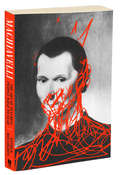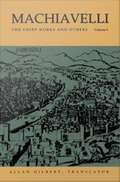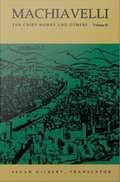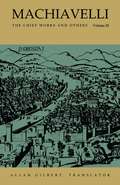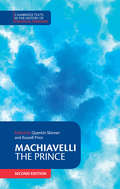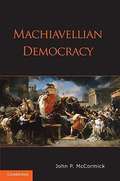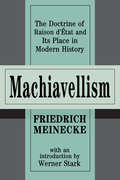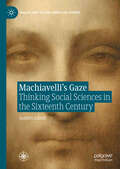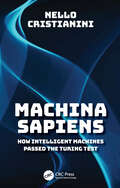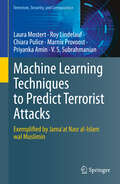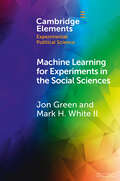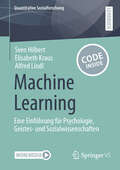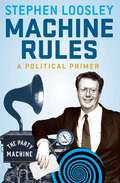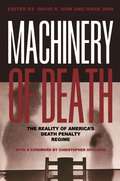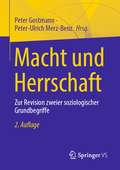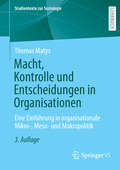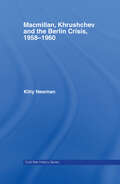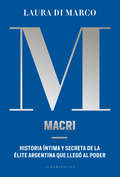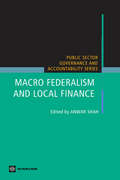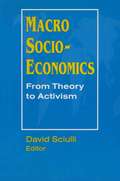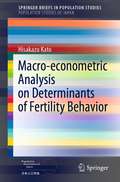- Table View
- List View
Machiavelli: The Art of Teaching People What to Fear
by Patrick BoucheronIn a series of poignant vignettes, a preeminent historian makes a compelling case for Machiavelli as an unjustly maligned figure with valuable political insights that resonate as strongly today as they did in his time. Whenever a tempestuous period in history begins, Machiavelli is summoned, because he is known as one for philosophizing in dark times. In fact, since his death in 1527, we have never ceased to read him to pull ourselves out of torpors. But what do we really know about this man apart from the term invented by his detractors to refer to that political evil, Machiavellianism?It was Machiavelli's luck to be disappointed by every statesman he encountered throughout his life—that was why he had to write The Prince. If the book endeavors to dissociate political action from common morality, the question still remains today, not why, but for whom Machiavelli wrote. For princes, or for those who want to resist them? Is the art of governing to take power or to keep it? And what is &“the people?&” Can they govern themselves? Beyond cynical advice for the powerful, Machiavelli meditates profoundly on the idea of popular sovereignty, because the people know best who oppresses them.With verve and a delightful erudition, Patrick Boucheron sheds light on the life and works of this unclassifiable visionary, illustrating how we can continue to use him as a guide in times of crisis.
Machiavelli: The Chief Works and Others, Volume 1
by Allan Gilbert Nicollò di Bernado dei MachiavelliIncludes:<P><P> * The Prince<P> * The Legations<P> * Discourses<P> * and more<P> From praise for the 1965 edition: Allan Gilbert is unquestionably the most accurate and reliable translator of Machiavelli into English; the publication of this edition is an altogether happy occasion. Students of the history of political thought owe a particular debt of gratitude to Allan Gilbert. "--Dante Germino, The Journal of Politics "A most remarkable achievement. "--Felix Gilbert, Renaissance Quarterly
Machiavelli: The Chief Works and Others, Volume II
by Allan Gilbert Nicollò di Bernado dei MachiavelliIncludes:<P><P> * The Life of Castruccio Castracani of Lucca, <P> * The Art of War<P> * Maciavelli's Comedies: Mandragoa and Clizia<P> * Carnival Songs<P> * Letter and more<P> From praise for the 1965 edition: Allan Gilbert is unquestionably the most accurate and reliable translator of Machiavelli into English; the publication of this edition is an altogether happy occasion. Students of the history of political thought owe a particular debt of gratitude to Allan Gilbert. "--Dante Germino, The Journal of Politics "A most remarkable achievement. "--Felix Gilbert, Renaissance Quarterly
Machiavelli: The Chief Works and Others, Volume III
by Allan Gilbert Nicollò di Bernado dei MachiavelliIncludes: <P><P> * The History of Florence<P> * The Natures of Florentine Men<P> * The Decennale<P> * and more<P> From praise for the 1965 edition: Allan Gilbert is unquestionably the most accurate and reliable translator of Machiavelli into English; the publication of this edition is an altogether happy occasion. Students of the history of political thought owe a particular debt of gratitude to Allan Gilbert. "--Dante Germino, The Journal of Politics "A most remarkable achievement. "--Felix Gilbert, Renaissance Quarterly
Machiavelli: The Prince
by Quentin Skinner Russell PriceProfessor Skinner presents a lucid analysis of Machiavelli's text as a response to the world of Florentine politics.
Machiavelli: The Prince (Cambridge Texts in the History of Political Thought)
by Niccolo Machiavelli Quentin Skinner Russell PriceThis new edition of the acclaimed translation of Niccolò Machiavelli's The Prince - revised for the first time after thirty years - includes a rewritten and extended introduction by Quentin Skinner. Niccolò Machiavelli is arguably the most famous and controversial figure in the history of political thought. The Prince remains his best-known work, and throws down a challenge that subsequent writers on statecraft and political morality have found impossible to ignore. Quentin Skinner's introduction offers a lucid analysis of Machiavelli's text both as a response to the world of Florentine politics and as a critical engagement with the classical and Renaissance genre of advice-books for princes. This new edition also features an improved timeline of key events in Machiavelli's life, helping the reader place the work in the context of its time, in addition to an enlarged and fully updated bibliography.
Machiavellian Democracy
by John P. MccormickIntensifying economic and political inequality poses a dangerous threat to the liberty of democratic citizens. Mounting evidence suggests that economic power, not popular will, determines public policy, and that elections consistently fail to keep public officials accountable to the people. John P. McCormick confronts this dire situation through a dramatic reinterpretation of Niccol- Machiavelli's political thought. Highlighting previously neglected democratic strains in Machiavelli's major writings, McCormick excavates institutions through which the common people of ancient, medieval, and Renaissance republics constrained the power of wealthy citizens and public magistrates, and he imagines how such institutions might be revived today. Machiavellian Democracy fundamentally reassesses one of the central figures in the Western political canon and decisively intervenes into current debates over institutional design and democratic reform. Inspired by Machiavelli's thoughts on economic class, political accountability and popular empowerment, McCormick proposes a citizen body that excludes socioeconomic and political elites and grants randomly selected common people significant veto, legislative, and censure authority within government and over public officials.
Machiavellism: The Doctrine of Raison d'Etat and Its Place in Modern History
by Friedrich Meinecke Werner Stark Douglas ScottHere is a study, by a recognized master in the field of intellectual history, of the challenge put by Machiavelli to the idea that there is a universal moral law governing human behavior. Should the political leader act according to the maxim of "my country right or wrong," or should elites follow the principle of "let justice be done?" Friederich Meinecke, an acknowledged founder of cultural history as a field, follows the discussion of this theme from Machiavelli through such major figures as Richelieu, Frederick the Great, and Hegel, and presents conclusions of enduring significance.
Machiavelli’s Gaze: Thinking Social Sciences in the Sixteenth Century (Italian and Italian American Studies)
by Sandro LandiThis book examines Machiavelli in contemporary or past realities through the way in which he read, wrote, related to cultures distant in time and space—a first in the field of Machiavellian studies. It proposes and experiments with a change of perspective: in essence, it is not interested in what Machiavelli probably was, but in what Machiavelli did. In this perspective, Machiavelli remains a paradoxically still little-explored historical case. Issues and methods developed in recent decades by intellectual history, the history of reading, and cultural anthropology have remained substantially unfamiliar to Machiavelli scholars. This is a book that renews the vision of Machiavelli: no longer the starting or finishing point of intellectual genealogies that are often openly ideological, but an extraordinary case study that allows us to analyse the birth, in the sixteenth century, of a composite knowledge specifically dedicated to man in society.
Machina Sapiens: How Intelligent Machines Passed the Turing Test
by Nello CristianiniCan machines think? This troubling question, posed by Alan Turing in 1950, has perhaps been answered: today we can converse with a computer without being able to distinguish it from a person.Machines can pass university exams and program other computers. ChatGPT, Bard, and other 'language models' have proved proficient at performing tasks far beyond their creators’ initial expectations, and we still do not know why. Trained simply to predict missing words in a text, such models have gained an understanding of the world and language that makes them capable of reasoning, planning, solving problems, as well as conversing almost flawlessly. Is this the secret of knowledge, and is it now in the hands of our creations? Perhaps we are no longer alone. And as we try to figure out how to share these powers with the 'aliens' who now work at our side, we can wonder what else they may learn tomorrow. Are we approaching a critical threshold beyond which machines will attain superhuman performance?Following on from The Shortcut, Nello Cristianini has authored another brilliant book – written like a gripping thriller – explaining the ideas behind a technology destined to change the world. If our worst terror has always stemmed from fear of the unknown, the cure, since time immemorial, is knowledge.
Machine Learning Techniques to Predict Terrorist Attacks: Exemplified by Jama'at Nasr al-Islam wal Muslimin (Terrorism, Security, and Computation)
by Roy Lindelauf V.S. Subrahmanian Chiara Pulice Laura Mostert Marnix Provoost Priyanka AminOne of the most influential actors in spreading Islamist violence across the Sahel is Jama&’at Nasr Al Islam Wal Muslimin (JNIM).This book provides the first systematic quantitative analysis of JNIM&’s behavior by analyzing a 12-year database of JNIM&’s attacks and the environment surrounding JNIM. This book leverages AI/ML predictive models to accurately predict almost 40 types of attacks using over 80 independent variables. This book describes a set of temporal probabilistic rules that state that when the environment in which the group operates satisfies some conditions, then an attack of a certain type will likely occur in the next N months. This provides a deep, easy to comprehend understanding of the conditions under which JNIM carries various kinds of attacks up to 6 months into the future. This book will serve as an invaluable guide to scholars (computer scientists, political scientists, policy makers). Military officers, intelligence personnel, and government employees, who seek to understand, predict, and eventually mitigate attacks by JNIM and bring peace to the nations of Mali, Burkina Faso, and Niger will want to purchase this book as well.
Machine Learning for Environmental Noise Classification in Smart Cities (Synthesis Lectures on Engineering, Science, and Technology)
by Ali Othman AlbajiWe present a Machine Learning (ML) approach to monitoring and classifying noise pollution. Both methods of monitoring and classification have been proven successful. MATLAB and Python code was generated to monitor all types of noise pollution from the collected data, while ML was trained to classify these data. ML algorithms showed promising performance in monitoring the different sound classes such as highways, railways, trains and birds, airports and many more. It is observed that all the data obtained by both methods can be used to control noise pollution levels and for data analytics. They can help decision making and policy making by stakeholders such as municipalities, housing authorities and urban planners in smart cities. The findings indicate that ML can be used effectively in monitoring and measurement. Improvements can be obtained by enhancing the data collection methods. The intention is to develop more ML platforms from which to construct a less noisy. The second objective of this study was to visualize and analyze the data of 18 types of noise pollution that have been collected from 16 different locations in Malaysia. All the collected data were stored in Tableau software. Through the use of both qualitative and quantitative measurements, the data collected for this project was then combined to create a noise map database that can help smart cities make informed decisions.
Machine Learning for Experiments in the Social Sciences (Elements in Experimental Political Science)
by Jon Green Mark H. White, IICausal inference and machine learning are typically introduced in the social sciences separately as theoretically distinct methodological traditions. However, applications of machine learning in causal inference are increasingly prevalent. This Element provides theoretical and practical introductions to machine learning for social scientists interested in applying such methods to experimental data. We show how machine learning can be useful for conducting robust causal inference and provide a theoretical foundation researchers can use to understand and apply new methods in this rapidly developing field. We then demonstrate two specific methods – the prediction rule ensemble and the causal random forest – for characterizing treatment effect heterogeneity in survey experiments and testing the extent to which such heterogeneity is robust to out-of-sample prediction. We conclude by discussing limitations and tradeoffs of such methods, while directing readers to additional related methods available on the Comprehensive R Archive Network (CRAN).
Machine Learning: Eine Einführung für Psychologie, Geistes- und Sozialwissenschaften (Quantitative Sozialforschung)
by Alfred Lindl Sven Hilbert Elisabeth KrausDieses Buch richtet sich an alle, welche die enormen Potenziale maschinellen Lernens für wissenschaftliche Fragestellungen und innovative Ansätze in Studium oder Beruf nutzen möchten. Denn maschinelles Lernen eröffnet neue Möglichkeiten zum effizienten Umgang mit umfassenden, komplex strukturierten und sich schnell entwickelnden Daten. Zunächst werden Grundideen und typische Anwendungsfelder maschinellen Lernens sowie dessen Vorzüge gegenüber inferenzstatistischen Verfahren erläutert. Daran schließen praktische Hinweise dazu an, wie Daten für maschinelle Lernprozesse aufbereitet werden und wie diese durch Anpassung verschiedener Parameter möglichst optimale Ergebnisse erzielen können. Von den hierzu einsetzbaren Modellen werden die gängigsten theoretisch und anhand anschaulicher Beispiele vorgestellt. Auch auf verschiedene Optionen zur besseren Interpretierbarkeit sowie auf spezifische Limitationen von Analyseresultaten wird eingegangen. Weiterführende Anwendungsfälle und verständlich kommentierte Analysecodes sind auf dem GitHub-Repositorium zu diesem Buch auf SpringerLink online verfügbar.
Machine Rules: A political primer
by Stephen LoosleyBut does a powerbroker like Stephen Loosley ever leave the political word? In his candid memoir, Loosley writes about defending the indefensible, the best way to start and kill off rumours, the value of truth in campaigning, how to use humour to squash a scandal, the key to fundraising and why bullshit always comes back to smother you.
Machine and Sovereignty: For a Planetary Thinking
by Yuk HuiDeveloping a new political thought to address today&’s planetary crises What is &“planetary thinking&” today? Arguing that a new approach is urgently needed, Yuk Hui develops a future-oriented mode of political thought that encompasses the unprecedented global challenges we are confronting: the rise of artificial intelligence, the ecological crisis, and intensifying geopolitical conflicts. Machine and Sovereignty starts with three premises. The first affirms the necessity of developing a new language of coexistence that surpasses the limits of nation-states and their variations; the second recognizes that political forms, including the polis, empire, and the state, are technological phenomena, which Lewis Mumford terms &“megamachines.&” The third suggests that a particular political form is legitimated and rationalized by a corresponding political epistemology. The planetary thinking that this book sketches departs from the opposition between mechanism and organism, which characterized modern thought, to understand the epistemological foundations of Hegel&’s political state and Schmitt&’s Großraum and their particular ways of conceiving the question of sovereignty. Through this reconstruction, Hui exposes the limits of the state and reflects on a new theoretical matrix based on the interrelated concepts of biodiversity, noodiversity, and technodiversity. Arguing that we are facing the limit of modernity, of the eschatological view of history, of globalization, and of the human, Hui conceives necessary new epistemological and technological frameworks for understanding and rising to the crises of our present and our future. Retail e-book files for this title are screen-reader friendly.
Machinery of Death: The Reality of America's Death Penalty Regime
by David R. Dow Mark DowFirst Published in 2002. Routledge is an imprint of Taylor & Francis, an informa company.
Macht und Herrschaft: Zur Revision zweier soziologischer Grundbegriffe
by Peter Gostmann Peter-Ulrich Merz-BenzDas Buch befasst sich mit Kernbegriffen der Sozialwissenschaften: Macht und Herrschaft. Mit Beiträgen von Gerhard Wagner, Guy Oakes, Hubert Treiber, Peter Gostmann, Peter-Ulrich Merz-Benz, Dirk Tänzler und Stephen Turner.
Macht, Kontrolle und Entscheidungen in Organisationen: Eine Einführung in organisationale Mikro-, Meso- und Makropolitik (Studientexte zur Soziologie)
by Thomas MatysDiese Einführung stellt die grundlegenden organisationstheoretischen Ansätze und Theoriestränge dar, die Macht, Kontrolle und Entscheidungen in und durch Organisationen zum Inhalt haben. Die Wechselwirkungen des handelnden Subjekts innerhalb der Macht-, Kontroll- und Entscheidungsmodi sowie die Entstehung und Definition des Machtbegriffes werden eingehend beschrieben. Durch eine Analyse mikro-, meso- und makropolitischer Ordnungsraster werden arbeits- und organisationssoziologische Diskurse, die innerhalb organisationaler Macht-, Kontroll- und Entscheidungskontexte relevant sind und bis zur „digitalen Transformation“ reichen, aufgezeigt.
Mackintosh's The Government and Politics of Britain
by Peter G. RichardsThis student mainstay continues to be organised around constitutional themes, with new material on local elections, the politics of the centre and the limits of state power. Essential for all introductory students of British politics and current affairs.
Macmillan, Khrushchev and the Berlin Crisis, 1958-1960 (Cold War History)
by Kitty NewmanThis new study casts fresh light on the roles of Harold Macmillan and Nikita Khrushchev and their efforts to achieve a compromise settlement on the pivotal Berlin Crisis. Drawing on previously unseen documents and secret archive material, Kitty Newman demonstrates how the British Prime Minister acted to prevent the crisis sliding into a disastrous nuclear conflict. She shows how his visit to Moscow in 1959 was a success, which convinced Khrushchev of a sincere effort to achieve a lasting settlement. Despite the initial reluctance of the French and the Americans, and the consistent opposition of the Germans, Macmillan’s subsequent efforts led to a softening of the Western line on Berlin and to the formulation of a set of proposals that might have achieved a peaceful resolution to the crisis if the Paris Conference of 1960 had not collapsed in acrimony. This volume also assesses Khrushchev’s role, which despite his sometimes intemperate language, was to secure a peaceful settlement which would stabilize the East German regime, maintain the status quo in Europe and prevent the reunification of a resurgent, nuclearized Germany, thereby paving the way for disarmament. This book will be of great interest to all students of post-war diplomacy, Soviet foreign policy, the Cold War and of international relations and strategic studies in general.
Macri: Historia íntima y secreta de la élite argentina que llegó al poder
by Laura Di MarcoPor primera vez, Mauricio Macri habla para contar como nunca antes el detrás de escena del nuevo poder en la Argentina. La difícil relación con su padre, los amigos de la infancia que hoy son funcionarios, asesores o empresarios. Los secretos más íntimos y polémicos del hombre que sorprendió a todos. Este libro desnuda a un Macri privado y sin filtro: un presidente que en su más profunda intimidad padece el poder, y que empujado por un mandato inconfesable llega inesperadamente a la Casa Rosada para destronar al populismo. Ilumina las contradicciones de un líder extraño, que a menudo va contra el establishment al que él mismo pertenece. Devela la trama íntima de un joven educado para convertirse en el heredero de un sospechado emporio económico, que un día decide torcer su propio destino enfrentando a un padre narcisista, que siempre buscó anularlo. Descubre la trastienda del poder a través de las sesiones con su psicoanalista, José Luis Ahumada; el entrenamiento con el coach oculto del Pro, Alberto "Tito" Lederman; y el decisivo encuentro con quien fue el desconocido terapeuta de Alfonsín, Eduardo Issaharoff. Muestra la verdadera influencia de Jaime Durán Barba y de su mejor discípulo, Marcos Peña. Y cómo la filosofía budista formatea su concepción de la política. También se zambulle en el elenco de figuras del nuevo poder y narra la evolución de la élite argentina y de sus ideas: una clase dirigente que se fue aggiornando hasta acoplarse a aliados impensables, como los radicales y la Coalición Cívica de Elisa Carrió. Laura Di Marco ha escrito el primer gran libro político desde que Mauricio Macri llevó a la élite argentina al poder. Una historia cautivante, que arranca en la madrugada previa a su asunción, cuando su círculo de amigos decide "tomar" en secreto la Casa Rosada. Con asombrosos encuentros cara a cara con Macri y más de sesenta entrevistas a su entorno íntimo, Di Marco cuenta esta saga con el virtuosismo de los grandes periodistas literarios. Una investigación imprescindible para entender qué pasó en la Argentina en 2015 y encontrar claves hacia el futuro.
Macro Federalism and Local Finance
by Anwar M. ShahThe design of a federal system to deal with growth, stabilization, and regional and local development issues is the primary concern of this volume, edited by Anwar Shah. The book provides analytical tools to address issues arising from globalization, localization, and regional integration. It discusses tax harmonization issues associated with subnational value added tax administration. It provides a framework for fiscal discipline in a federal system. Lessons from international experiences from policies to deal with lagging regions are drawn. The book empirically examines the effect of fiscal decentralization on the overall size of the public sector. Finally, it draws lessons from industrial countries' experiences on local governance. This important new series represents a response to several independent evaluations in recent years that have argued that development practitioners and policy makers dealing with public sector reforms in developing countries and, indeed, anyone with a concern for effective public governance could benefit from a synthesis of newer perspectives on public sector reforms. This series distills current wisdom and presents tools of analysis for improving the efficiency, equity, and efficacy of the public sector. Leading public policy experts and practitioners have contributed to the series.
Macro Socio-economics: From Theory to Activism
by David SciulliContributors to this volume respond to the normative capsule framing economic behaviour that Amitai Etzioni has explored. The text also looks at his works on organisations, public policy, socio-economics and communitarianism.
Macro-econometric Analysis on Determinants of Fertility Behavior (SpringerBriefs in Population Studies)
by Hisakazu KatoThe book comprises three chapters, with each chapter assigned various type data such as time series data, cross sectional data and panel data. The purpose of this book is to explore the economic and social determinant factors of fertility. Unlike many previous empirical analyses of fertility and the related demographic events, this research has three characteristics. The first is that the relationship between fertility and labor participation by females is thoroughly considered, with much discussion about the structural change between those factors. The second is that time series analysis such as the Bayesian vector autoregressive (BVAR) model or co-integration concepts is applied to explore the determinant factors of fertility. The third is that the effectiveness of public policies related to improve fertility is confirmed. In recent years, micro-econometric analysis has become popular; however, this book takes another approach from the perspective of macro- or semi-macro-econometrics.
